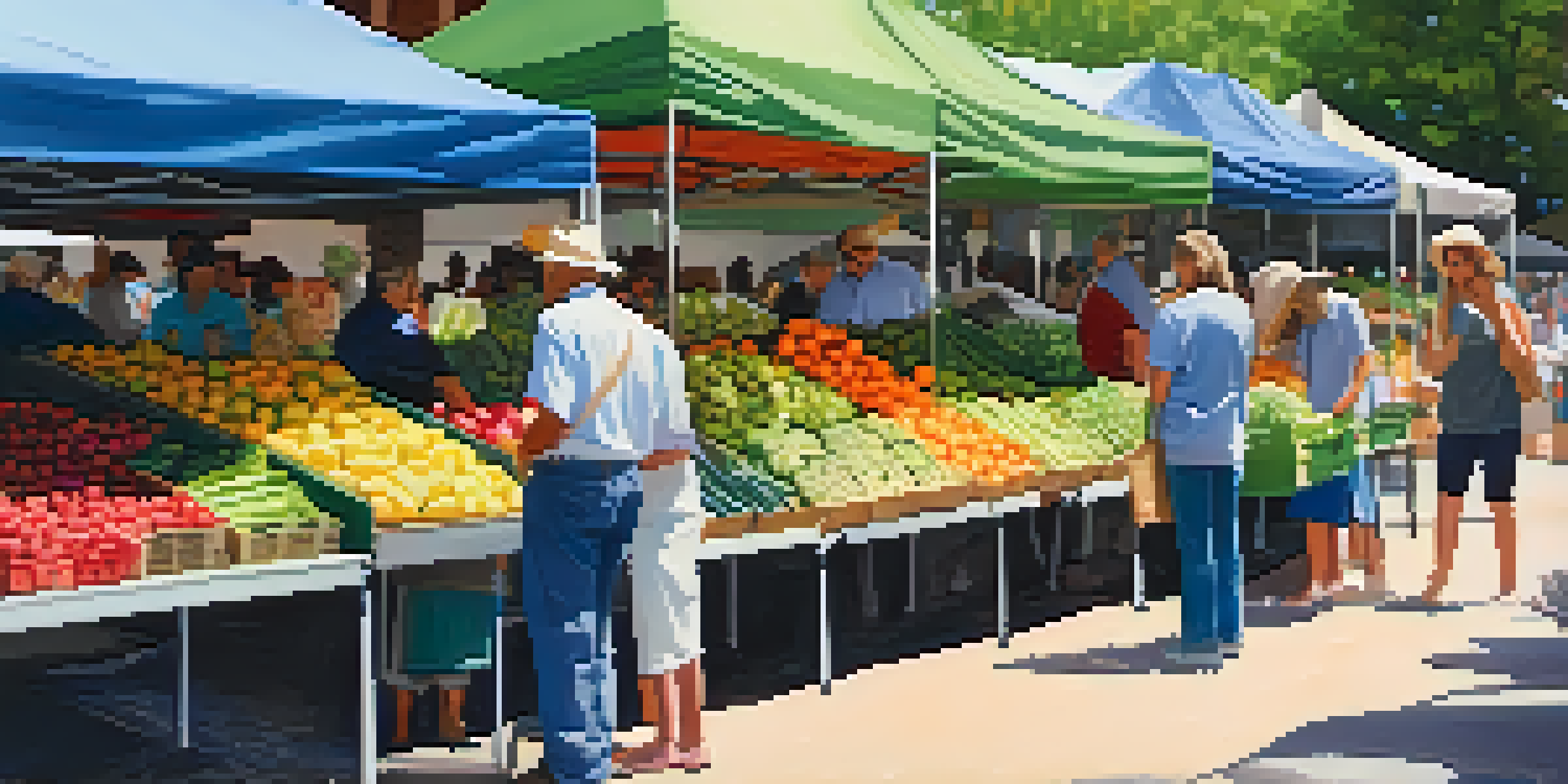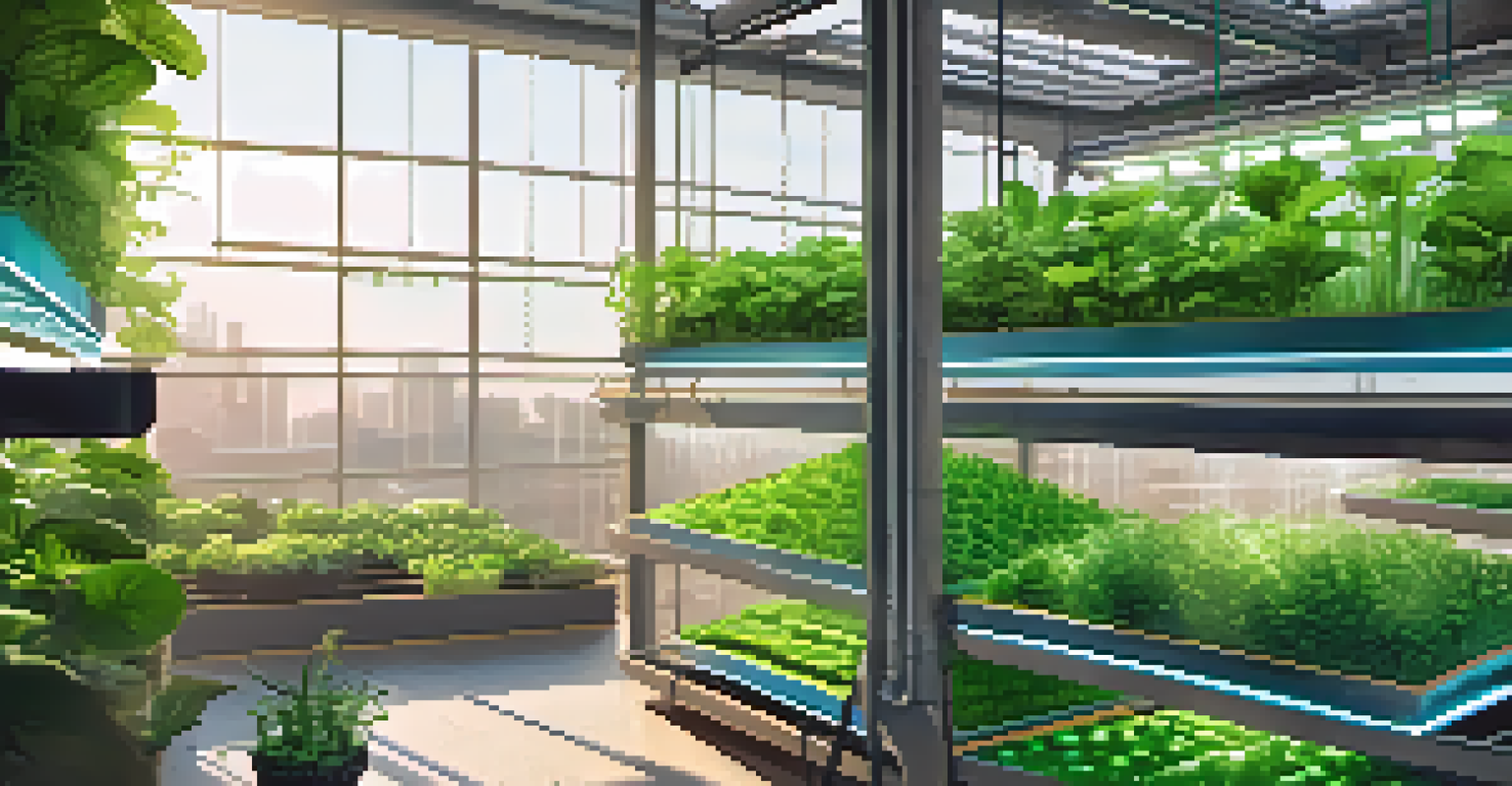Sustainable Practices Among Austin's Craft Food Producers

Understanding Sustainability in the Food Industry
Sustainability in the food industry refers to practices that minimize environmental impact while promoting economic viability. It’s about producing food in ways that preserve the planet for future generations. For craft food producers in Austin, this means rethinking everything from sourcing ingredients to packaging.
Sustainability is not a destination, but a journey; it requires continuous commitment and innovation.
These producers often prioritize local sourcing, which not only supports the community but also reduces carbon footprints associated with transportation. Think of it like a farmer’s market on a larger scale, where fresh ingredients are just a short drive away. By connecting directly with local farmers and suppliers, these businesses contribute to a sustainable local economy.
Additionally, sustainability in food production encourages the use of organic and regenerative farming practices. These methods improve soil health and biodiversity, creating a more resilient food system. By embracing these principles, Austin’s craft food producers are taking significant steps toward a healthier planet.
Local Sourcing: A Key Component
Local sourcing is one of the most impactful sustainable practices employed by Austin's craft food producers. By sourcing ingredients from nearby farms, food producers can ensure fresher products while reducing transportation emissions. This not only enhances the flavor profiles of their offerings but also strengthens community ties.

For instance, many craft breweries in Austin collaborate with local farmers to source ingredients like hops and grains. This not only supports local agriculture but also allows brewers to experiment with unique flavors that reflect the region's terroir. It’s a win-win situation where both producers and consumers benefit from high-quality, locally-sourced products.
Local Sourcing Boosts Sustainability
Austin's craft food producers enhance flavor and community ties by sourcing ingredients locally, reducing transportation emissions.
Moreover, local sourcing often means that the food is seasonal, which aligns with sustainable eating practices. By consuming what’s in season, consumers help reduce the demand for out-of-season produce that requires extensive transportation. This conscious choice fosters a deeper connection between food producers and their customers.
Waste Reduction Strategies in Production
Waste reduction is a critical element of sustainability for Austin's craft food producers. Many are adopting creative strategies to minimize waste throughout their production processes. This includes everything from reusing by-products to implementing efficient inventory management systems.
The greatest threat to our planet is the belief that someone else will save it.
For example, some craft distilleries use leftover grains from the brewing process to create animal feed or even baked goods. This not only reduces waste but also adds value to what would otherwise be discarded. Such innovative practices demonstrate a commitment to sustainability while also highlighting the versatility of food ingredients.
Additionally, composting is becoming a common practice among these producers. By composting food scraps and packaging materials, they contribute to a circular economy that enriches soil and promotes biodiversity. It's a simple yet effective way to ensure that waste doesn’t just end up in a landfill.
Eco-Friendly Packaging Solutions
Packaging is often overlooked in discussions about sustainability, yet it plays a crucial role in how food is produced and consumed. Austin's craft food producers are increasingly opting for eco-friendly packaging solutions that minimize environmental impact. This shift reflects a growing awareness of the importance of sustainable practices in all aspects of the food industry.
Many producers are choosing biodegradable or compostable materials that break down more easily than traditional plastics. For instance, some local chocolate makers are using wrappers made from plant-based materials. These choices not only appeal to environmentally-conscious consumers but also help reduce the overall waste generated by food production.
Innovative Waste Reduction Practices
Many producers are adopting creative waste reduction strategies, such as repurposing by-products and composting, to minimize their environmental impact.
Furthermore, reusable packaging options are gaining traction, with some producers encouraging customers to bring their own containers. This practice not only cuts down on single-use items but also fosters a sense of community among consumers. It’s a small step that can make a big difference in promoting a sustainable lifestyle.
Community Engagement and Education
Community engagement is essential for fostering a culture of sustainability. Many craft food producers in Austin actively involve their customers in their sustainability efforts through educational initiatives. This includes workshops, farm tours, and tasting events that emphasize the importance of local sourcing and eco-friendly practices.
By hosting these events, producers not only educate consumers about their methods but also create a sense of connection between the food and those who consume it. It’s a great way to share stories about where the food comes from and the people behind it. This transparency builds trust and encourages consumers to make more sustainable choices.
Moreover, these community efforts often extend to collaborations with local schools and organizations, promoting sustainability education among younger generations. By instilling these values early on, craft food producers are helping to cultivate a more informed and environmentally-conscious community.
Innovations in Sustainable Farming Practices
Innovation is at the heart of sustainability, and many craft food producers in Austin are leading the charge with new farming practices. Techniques like vertical farming and aquaponics are gaining popularity, allowing producers to grow food in urban settings with minimal land use. This not only maximizes space but also reduces the environmental impact associated with traditional farming.
Additionally, regenerative agriculture is becoming a cornerstone of sustainable practices. This method focuses on restoring soil health and biodiversity, leading to more resilient ecosystems. Many local farmers are adopting these techniques to improve crop yields while ensuring long-term sustainability.
Education Fosters Sustainable Choices
Community engagement through workshops and events helps consumers understand the importance of sustainability, encouraging informed food choices.
These innovations not only benefit the producers but also provide consumers with high-quality, sustainable food options. As more craft food producers embrace these methods, they contribute to a growing movement that prioritizes environmental responsibility and food security.
The Role of Certifications in Sustainability
Certifications play a vital role in helping consumers identify sustainable products. Many craft food producers in Austin seek certifications like USDA Organic or Fair Trade to validate their commitment to sustainable practices. These labels provide assurance to consumers that the products meet specific environmental and ethical standards.
Having these certifications can also enhance a producer's reputation and marketability. Consumers are increasingly looking for transparency in their food choices, and certifications provide a clear signal of a brand's values. This trend encourages more producers to adopt sustainable practices to stay competitive in the market.

However, it's essential for consumers to understand what these certifications mean. By educating themselves about the standards behind these labels, consumers can make informed choices that align with their values. This ultimately drives demand for more sustainably produced food.
Looking Ahead: The Future of Sustainable Food in Austin
The future of sustainable food production in Austin looks promising, with a growing number of craft food producers committed to eco-friendly practices. As awareness of environmental issues continues to rise, more consumers are seeking out sustainable options. This shift in consumer behavior is likely to inspire even more producers to adopt sustainable practices.
Moreover, advancements in technology are paving the way for innovative solutions in food production. From vertical farms to precision agriculture, these technologies can help craft food producers operate more sustainably while meeting the demands of an ever-growing population. The potential for change is immense.
Ultimately, the collaborative spirit of Austin's food community will play a crucial role in shaping the future of sustainability. By sharing knowledge, resources, and best practices, craft food producers can continue to lead the way, ensuring that sustainability remains a priority in the food industry.